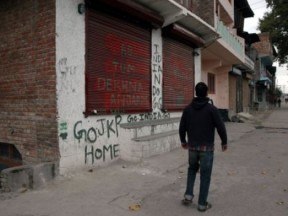I was a tad surprised when he told me that he wouldn’t be able to meet me late evening since it was late, and he would have to return home. You don’t always expect guys to rush homewards just because it is a trifle late. We had initially planned to meet early evening, but another appointment had held me up. So we caught up on phone, and fixed 8:30 am the next morning for a tête-à-tête.
Since you don’t expect things to move at the same pace in Kashmir as they do in Delhi, I took it easy. I was late from the word go; he wasn’t. The young man was there in the hotel lobby on time. The pleasantries done, we exchanged notes. Real ones this time, and not the Facebook kinds as we had often shared earlier. For this was a guy I had come to know from the world’s largest social networking site.
I had known him for a year or so, and had often fallen back on him for information. He had ungrudgingly come to my aid whenever I needed help with research. The information he provided was always based on sources whose veracity I could not question. One could not find a bias anywhere. There were times when I was moved by the amount that he would type only to help me in my work.
And then there was this evening when I found him doing weird stuff– the kind of silly things you do on Facebook when you are sitting idle. “Don’t have anything better to do?” I inboxed him. Pat came his reply, “What to do? There’s curfew outside. Can’t do anything else.” I chuckled. Cute young fella, I thought.
I had expected him to be affable, and this he was. He was also open-minded, candid. He said he had a Pakistan bent of mind. He also said the younger lot wanted neither India nor Pakistan; but complete independence. He did not seem to have issues there. I did not have any with him either. But funny that he talked of the “younger” lot; this fellow, still in his twenties.
Yet his appearance, the way he presented himself was a bit misleading. I realised this in the course of our hurried conversation – when he dropped a bombshell. His brother, younger to him, had gone missing last year, shortly before the street protests had begun. A few days later, his body was recovered. It took close to a year for the family to get the relevant papers. And this had just happened.
It hit me hard. Disappearances and killings were what had dominated our exchanges on Facebook, but never for once had he told me of his own loss. I could see him putting up a brave face, his grief hidden behind his charming smile. I thought I saw his eyes glisten a bit when he said that his brother had been his backbone. Not the backbone bit, but I could relate to what it might mean for a man to lose his younger brother. I remember throwing up my own younger brother in the air when he was a toddler. And catching him back. Just for kicks.
My Facebook friend needed to rush to work, and our meeting had to be brought to a — to borrow a cliche — grinding halt. I hung around Srinagar for quite a few days more, but couldn’t find the time to meet him again.
As I kept interacting with people, from all walks of life, it slowly began to sink in. Most parents in Kashmir frantically wait for their sons to return to their hearth. And so would have been the case with his parents. That was the reason why he had to ditch me that evening, and head for home.
I don’t know when I might visit Kashmir a second time. Or whether I will ever meet him again. But I do hope that he returns to his parents every evening.
PS: This piece could have well been titled Where parents wait for their sons to come home.
Subir Ghosh is a New Delhi-based independent journalist and writer. He has worked with the Press Trust of India (PTI) and The Telegraph, and handled publications/communications for the Centre for Science and Environment (CSE), the Federation of Hotels and Restaurant Associations of India (FHRAI), and the Wildlife Trust of India (WTI). He specialises in Northeast affairs and is an advisory council member with the Centre for Northeast Studies (C-NES). He is the author of ‘Frontier Travails: Northeast – The Politics of a Mess’ published by Macmillan India, and has won two national awards in children’s fiction. His subjects of interest include conflict, ethnicities, wildlife, human rights, poverty, media, and cinema. He blogs at www.write2kill.in where the above story was first published.







So true. I witnessed the same kind of vandalism (as in the picture) on a recent trip to the J&K capital. And everyone, right from our chauffer to the hotel managers and strangers who we befriended referred to Muzaffarabad as “Azad Kashmir” and how they dream of being ‘left alone’ literally. Thanks for the read 🙂
waiting parents…
thank you for this poignant article